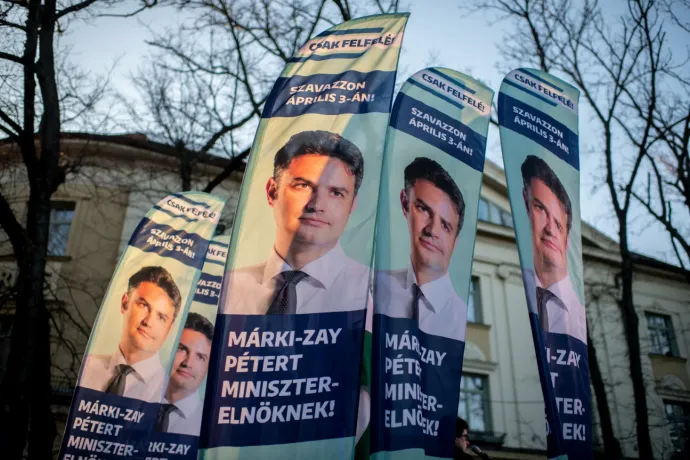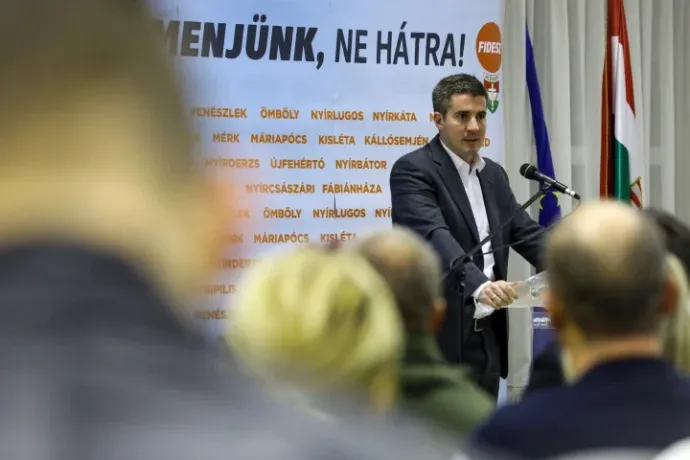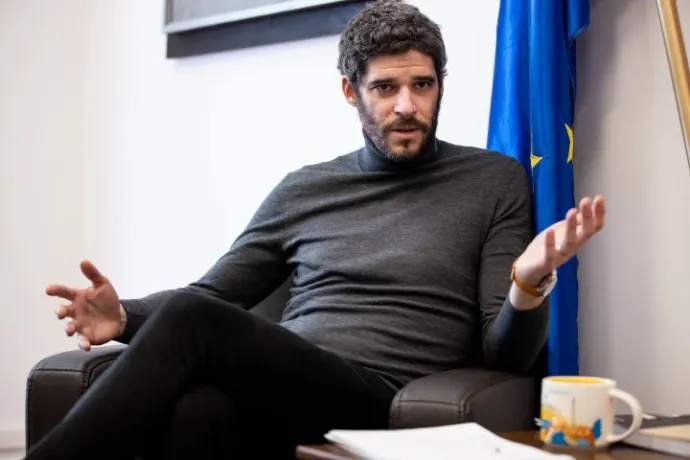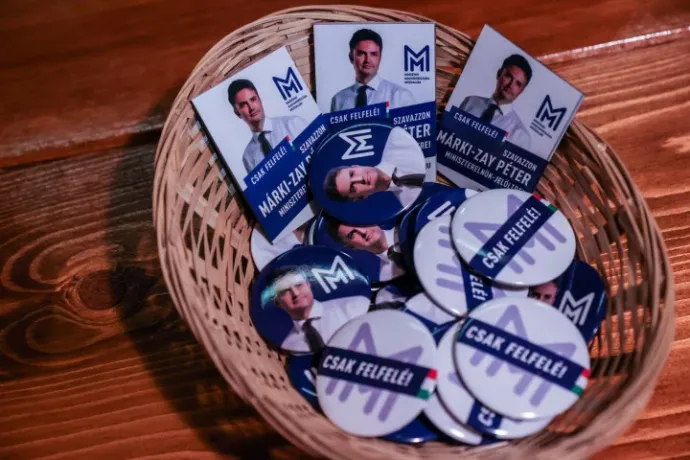It wasn't CIA-controlled reptilians who supported Péter Márki-Zay's movement – says head of NGO that raised funds

Péter Márki-Zay's movement received nearly HUF 2 billion (nearly 5 million euros) from the United States during this year's Hungarian election campaign. The opposition's former candidate for prime minister says all the rules were followed, but Fidesz is talking about the most serious party funding scandal since the fall of communism. The funds were raised by Action for Democracy (A4D), an NGO founded in February and led by Dávid Korányi, a city diplomacy consultant to Budapest's opposition mayor Gergely Karácsony. According to Korányi, it is not true that they wanted to interfere in the election, and while CÖF („Civil Union Forum” a pro-government NGO) is openly conducting party politics from taxpayers' money, A4D has been using the support of Hungarians who have moved abroad to help Márki-Zay's civil movement. Police and secret services are investigating and may soon disclose classified material. Until then, we know hardly any facts, and we are left with the government's well-constructed campaign about what they are calling "the dollar-financed left".
At last week's government briefing, Gergely Gulyás, Minister of the Prime Minister's Office, called the fact that Péter Márki-Zay's movement received nearly two billion forints in funding from the United States during the election campaign the most serious party financing scandal since the fall of communism.
In late August, the former prime ministerial candidate of the opposition party alliance spoke on the podcast of the weekly Magyar Hang about the hundreds of millions of forints that were still coming from the United States in the middle of the summer, raised by Action for Democracy (A4D) among Hungarians living in the diaspora.
Hungarian law strictly prohibits foreign funding of political parties.
According to Péter Márki-Zay, however, they acted in accordance with the law in everything, because it was not the parties supporting him, but his civil movement, the Everybody's Hungary Movement (MMM), that received the money. He told HVG360 that "the parties ran the party campaign" from around one billion forints. This includes state support for individual candidates as well. In addition, according to the former candidate for prime minister, MMM's "culture-change campaign", which did not include party logos on its materials, was completely separate. This was the case, for example, when they put up posters saying "Orbán is a liar, so he is afraid to debate" or "Orbán is leaving. Independent Health and Education Ministries are coming!"
According to Péter Márki-Zay, it would have been illegal party funding if party logos had been used on MMM materials. However, he claims that this did not happen.
"The daily operation was supervised by experts from six parties. They were keeping a watchful eye to make sure that there was no illegal party financing."
– the mayor of Hódmezővásárhely told HVG360. While the six parties campaigned from roughly HUF 1 billion, MMM spent nearly HUF 2.5 billion, of which HUF 1.8 billion came from the US. This means that half of the opposition's HUF 3.5 billion campaign was financed by foreign money.
Máté Kocsis writes about shocking facts and actions that seriously violate the sovereignty of the country
It is not surprising that after Márki-Zay's statement in late summer, the entire government-party media pounced on the subject. In recent months, there hasn't been a day when Fidesz politicians, government members and spokespeople didn't talk about the campaign financing of the opposition.
The terms 'dollar-financed left', 'rolling dollars' and 'dollar daddy' were created.
According to Fidesz's communication, the funding was actually an attempt to influence the Hungarian election and thus Hungarian domestic politics from the United States. At a forum in Tatabánya last week, Lajos Kósa, the vice president of the governing party, went so far as to say that the opposition supports the introduction of sanctions because it dances to the tune of the Americans who finance them.
Meanwhile, the police have launched an investigation into suspected embezzlement and money laundering against an unknown perpetrator, and according to HVG, the Constitution Protection Office (AH) is also collecting data on the case. In addition, MPs in the parliament's national security committee are regularly informed about the investigations by the secret services.
"The facts of the case are shocking, and the situation is much more serious than previous statements would suggest."
– Máté Kocsis, the leader of Fidesz' parliamentary group wrote after the committee's closed session last Thursday. The secret service material is secret until 2051, but Kocsis initiated its release "because it is about actions and transactions that seriously violate the sovereignty of the country, which the entire Hungarian public has the right to know about".

Zoltán Sas, a member of the opposition party Jobbik, the chairman of the National Security Committee, supports making the data received from the secret services available to the widest possible public. The Jobbik MP claims he had asked the keeper of the secrets to disclose the information that the panel learned in a closed session.
The Everybody's Hungary Movement reacted to the news in a press release. They wrote that they demanded that the secret services' report be made public so that "it becomes clear to everyone that we are only seeing one act of Fidesz's latest smear campaign".
"We will face all investigation without any fear, knowing that we have complied with all the legislation and that we have accounted for our grants accurately and transparently."
– MMM reacted earlier to the news of the investigation of the Constitution Protection Office, while Péter Márki-Zay told Telex that all documents were prepared for the secret service, which, in his opinion, continuously monitored him during the campaign, so it could already have plenty of information.
Dávid Korányi: It was included in the contract that the funding could not be used for the purpose of party politics
The leaders of the parties running a joint list in the elections regularly claim that they were unaware of the US subsidies and that Márki-Zay alone is responsible for them. Péter Ungár, the co-chair of LMP, said the money itself was a shock and the fact that many people did not see it as a problem was shocking as well.
One of the main actors in the story, the president of Action for Democracy (A4D), Dávid Korányi, has so far only reacted to the news in a Facebook post.
"I would never have dreamed that as a result of incitement by the government of an EU and NATO member state, I would be called a traitor and an agent in 2022.
– Korányi said. He is currently working as a city diplomacy consultant to Gergely Karácsony and was previously a chief adviser to Prime Minister Gordon Bajnai. Two months before the election, he founded Action for Democracy, an NGO in the United States whose advisory board includes world-renowned professors and public figures such as the philosopher-writer Francis Fukuyama and the historians Timothy Snyder and Timothy Garton Ash.
In response to a request from Telex, Korányi has now provided more details on the circumstances and details of the funding. He said that he was shocked by the government's discrediting of him at first, and is baffled by the whole thing, since his organisation issued a press release about the support in March, and then Péter Márki-Zay communicated about the US funds in a completely open way, and also made the amounts of the support public in a transparent manner.
"This is not funding for party politics nor is it campaign funding"
– Korányi said about the US money, and that's why he said that Péter Ungár and other opposition politicians could not have known about it.

A4D has supported an information, education and culture change campaign, he continued, which stands up for Euro-Atlantic values, the rule of law and democracy. Korányi also admitted that the timing was not coincidental, but he said that these values had nothing to do with party politics.
"When else should we try to show what Hungarian society is losing by the dismantling of democracy and the rule of law, the theft of EU funds, the eastward drift of politics and the timid cowering that the Hungarian government is putting on in the face of Russian aggression?" – he asked. He said these were absolutely relevant issues at the time of the election campaign and pointed out that no money was donated to the campaign of any party or candidate through his organisation.
We asked them how to separate the two in an election campaign, when the president of the civil movement they support, Péter Márki-Zay, was the prime ministerial candidate and list leader of the opposition parties.
"We made that very clear in the contract. It is in black and white that the two must be separated."
– A4D's leader told Telex, adding that the purpose of the funding was clearly defined in the contract.
What is the difference between CÖF and MMM?
Although there is no such legal requirement, they only accepted campaign contributions from Hungarians living in the diaspora. In response to our question, Korányi explained that they asked for the passport number of the donor on the fundraising page and could check whether he or she had Hungarian citizenship based on the format.
He does not understand why Hungarians living abroad should not be able to support a campaign in Hungary. "One can argue whether the Hungarian diaspora is an integral part of the nation or not. I see the government applying this criterion quite selectively," Korányi said.
– This money didn't come from CIA-controlled reptilians, but was donated by Hungarian citizens living in the diaspora."
According to him, most of the micro-donations were made by Hungarians who had left the country years or decades ago, who follow Hungarian public life closely and are disturbed by what is happening here at home and are afraid for their families who have stayed in Hungary. And the names could not even be made public because of legal requirements.
A few weeks ago at the government briefing, Gergely Gulyás said that no one should think that a foreign donor expects nothing in return for their money. Korányi does not know what expectation the Minister of the Prime Minister's Office had in mind. He claims that if anyone had made any demands in return for money, he would have refused their donation at that moment. Most of the donations were received via a website, and "there was no box to indicate the expectation".

The A4D president suggests that we should look at the HUF 1.8 billion transferred to the MMM account in context. He estimates that the government transfers roughly 250 billion forints of taxpayers' money annually for "blatantly partisan political purposes". And here we are talking about less than a hundredth of that.
"CÖF is spending taxpayers' money on an openly partisan political campaign. MMM received voluntary support from Hungarian citizens."
– said Korányi, who said there was a big difference between the two.
All in all, Korányi considers it a very serious and worrying warning that the government has deployed the entire state apparatus in the smear campaign and is openly using the secret services and the police for party political purposes. He feels that this is a way of intimidating NGOs, whom Viktor Orbán sees as his enemies.
The cooperation between Korányi and their NGO and MMM ended at the end of the summer, but A4D is not withdrawing from Hungary and would like to continue supporting NGOs, as they already do in Brazil and Italy.
For more quick, accurate and impartial news from and about Hungary, subscribe to the Telex English newsletter!
The translation of this article was made possible by our cooperation with the Heinrich Böll Foundation.